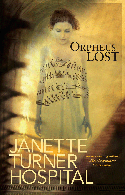 | Reviews of Orpheus Lost by Janette Turner Hospital HarperCollins May 2007 |
[This novel has been longlisted for the 2008 Miles Franklin Award.]
From the publisher's page
Leela is a gifted mathematician who has escaped her small Southern town to study in Boston. From the first moment she hears Mishka, a young Australian musician, playing his violin in a subway, his music grips her, and they quickly become lovers.ReviewsTheir souls, bodies, lives are fused, and love offers protection of sorts from the violence and anxiety around them, until Leela is taken off the street to an interrogation centre somewhere outside the city. There has been an 'incident', an explosion on the underground; terrorists are suspected, security is high. And her old childhood friend Cobb is conducting a very questionable investigation.
Now he reveals to her that Mishka may not be all he seems. That there may be more to his past than his story of growing up in the Daintree with an eccentric musical family. Leela has already discovered that Mishka is spending some evenings not at the Music Lab but at a cafe. A cafe, Cobb tells her, known to be a terrorist contact point.
Who can she believe?
In this compelling re-imagining of the Orpheus story, Leela travels to an underworld of kidnapping, torture and despair in search of the truth -- and the man she loves.
Judith Armstrong in "Australian Book Review": "With this, her eighth novel (several of the earlier ones having won distinguished prizes), Hospital shows her dazzling skill at thriller writing. This is not a generic put-down. The myriad twists and turns of the compellingly logical plot, the psychological scaffolding which convincingly underpins behavioural veracity, the darts from one country, one generation, one kind of wildly different mind to another -- all are handled with the ease of a master-planner who never falters for an instant. Nor do the pace and intensity let up. While the events might sometimes be described as hectic, and some of the later scenes as lurid, they are no more so than the contents of today's newspapers."
Andrew Reimer in "The Sydney Morning Herald": "On one level Orpheus Lost is a clever political thriller - with the usual contrivances, coincidences and occasional improbabilities of the genre - which will amuse and entertain many readers. They will also find within its pages several vivid passages describing the underhand tactics and dirty tricks employed by all sides in the war against terrorism...Unfortunately, Turner Hospital had greater ambitions than this. Her novel is weighed down with meditations on the redemptive nature of music, on the mysteries of the world of numbers and on how music and mathematics may come to be abused and perverted by religious fanaticism of several kinds."
Stella Clarke in "The Australian": "Hospital is hypnotic as she traces the relationship between music and mathematics, to an extent that borders on mysticism. Terror and torture amount to awful sacrilege in this universe. They attack and destroy the intricate, beautiful and sublime mechanics of life. She manages to communicate tragedy on a conceptual macro-scale as well as bring it home in the personal lives of her characters...This superbly gripping novel alerts us to the real cost of terrorism. Beyond immediate damage and death, we could allow an erosion of freedoms that we take for granted. The terror of terrorism, Hospital suggests, is causing tectonic shifts beneath our feet."
Peter Craven in "The Age": "Turner Hospital has a beautiful lightness of touch through the nightmare contortions of the plot she spins and twists like a rope of destiny...If the story is not quite as sure-footed as Grahame Greene in
comparable territory, if it swerves farther from the articulation of thriller-like enthralments, it is nonetheless almost as satisfying as it is involving...Part of what is so refreshing is the way the characterisation glows with such an easy, tacit humanity. Her characters are instantly alive, whatever hate or grief or lust it is that makes them pant through their masks and cavalcades...And the fact that the action is in part breakneck and full of dark intrigue makes this one of those serious books that should command the attention of people who read for pleasure."
Short notices
"Mostly Fiction: "Filled with rich action scenes related to contemporary issues, wonderful images, and themes dealing with illusion and reality, the ways our pasts govern our present, the importance of our parents in the shaping of our lives, and the prices we are willing to pay for love, the novel is exciting and tension-filled."
"Aust Crime Fiction": "Where ORPHEUS LOST becomes less of an interesting book is in a device that the author uses a lot -- where characters move rapidly from real life events into dreams / dream sequences / imaginings of events. There is certainly a lyrical flavour to these sequences but they also jar within the pace of the general book -- driving the reader out of the story."
